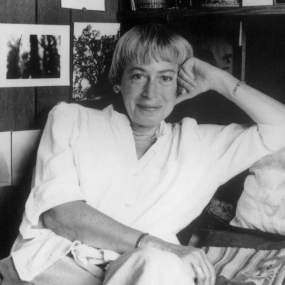Ursula K. Le Guin Has Gone on Ahead
January 24, 2018 § 26 Comments
 by Jan Priddy
by Jan Priddy
As soon as I open a document and before I begin typing, I select ‘Layout’ to indicate margins on my page. The guidelines do not show when I print, but they help me know where I am as I write.
Ursula K. Le Guin helps me know where I am.
She is not gone.
The obituaries are respectful. They list her more obvious accomplishments—the awards, the publications, her activism and generosity to other writers. They want to label her a “popular fantasy” writer, though these are not terms she would have chosen. “Why Are Americans Afraid of Dragons?” she asked in 1974. We dismiss what we consider “unrealistic” in our country, but that is a mistake. In the hands of a philosopher with substantial anthropological credentials, essays and poems, novels and stories are not escapism but challenges to our imagination.
For more than twenty years, I began my Junior English classes with Le Guin’s “The Wife’s Story” (1982) from Buffalo Gals. I read the five pages aloud, and then we talked about the nature of betrayal until the bell rang.
That most famous story, “The Ones Who Walk Away from Omelas” (1973), provokes questions: Would readers walk away or stay in paradise. Are we willing to allow another pay for our perfection? They are troubling questions, but contain another, underlying moral assumption: Must someone pay? In our superstitious faith in balance, do we demand another’s pain for our pleasure?
She gives us the suffering child in the basement because we insist that child exist.
“If you cannot or will not imagine the results of your actions, there’s no way you can act morally or responsibly,” Le Guin said in 2005.
My husband was standing at an information desk in Powell’s Book Store, a couple of years ago, when he recognized Ursula coming up the wide stairs and duck around into the Purple Room.
“There goes Ursula Le Guin,” he said to the millennial behind the counter.
“Who?”
We laughed about this again just the other day. Young sales clerks being what they are, they will learn.
Imagination is not mere child’s play, it is the only way we pursue what is possible, what is grand and just and beautiful.
She should have had the Nobel. She should have lasted longer because we need her here. We should have appreciated her more while we had her. My deepest sympathy to her family, her closest friends, and to all the rest of us.
___
Jan Priddy took classes from Ursula K. Le Guin, took tea in her Cannon Beach kitchen, ferried her to readings, and attended Jane Todd’s writers’ book club where Molly Gloss sat on her right, Ursula next, and Cheryl Strayed on her left. She read her books. They both had two years of Latin in high school and loved the beach.
Ursula K. Le Guin Talks Nonfiction
March 2, 2017 § 4 Comments
 David Naimon, host of “Between the Covers” on Portland, Oregon’s KBOO 90.7 FM, spoke recently with Ursula K. Le Guin about her collection of nonfiction, Words Are My Matter: Writings About Life and Books, 2000-2016.
David Naimon, host of “Between the Covers” on Portland, Oregon’s KBOO 90.7 FM, spoke recently with Ursula K. Le Guin about her collection of nonfiction, Words Are My Matter: Writings About Life and Books, 2000-2016.
“It is quite rare,” Naimon explains, “that Le Guin talks about her approach to writing nonfiction (essays, literary criticism, book reviews). We also talk about the risks and rewards of writing across difference (writing as a different race, gender, species), about the four strategies used to keep women writers out of the canon or diminished in the literary conversation, about America’s fear of the imagination, and of science, as well as talking about the work of Margaret Atwood, Cormac McCarthy, Chang-rae Lee, and Jose Saramago.”
You can listen here:
